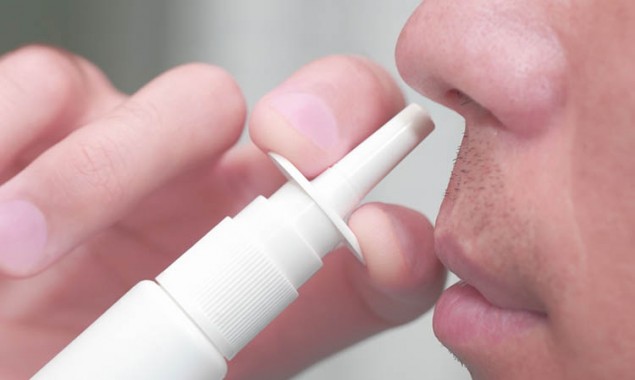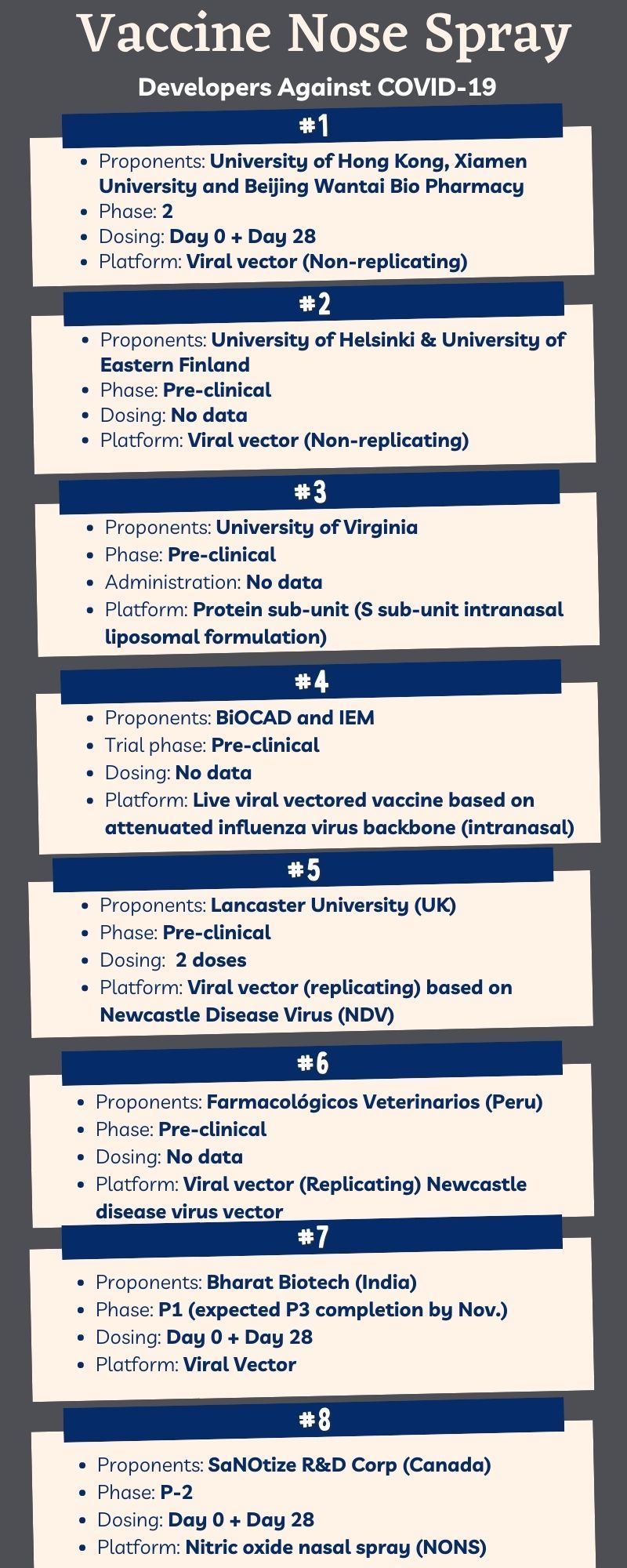Nasal spray containing povidone-iodine may reduce coronavirus spread
According to the preliminary research suggestions, an antiseptic nasal spray containing povidone-iodine...

COVID-19 Nasal Spray: To ward off Coronavirus – a squirt in the nose or a shot in the arm?
Key Points:
Even though we are in the initial stages of what I like to call the ‘vaccine’ era, the next generation of vaccines is already under development and it will not be administered with a syringe. According to research, an alternate, the nasal spray, is more preferred by the parents for their children as it offers a number of benefits over traditional approaches to vaccine administration.
Several reasons justify that nasal spray for vaccination might be a better alternative to the syringe. Firstly, it would result in rising in the vaccination drive as several countries are facing a shortage of intramuscular vaccines.
The current supply of COVID-19 vaccines is extremely limited and the majority of the doses go to developed nations which account for only 16% of the global population. Here’s how the nasal sprays have managed to change the game:
Q: What is the nasal vaccine?
A nasal shot is formally called the “intranasal” vaccine and is administered by squirting or spraying the solution into the nostrils. “The idea is that one gets infected through the nose. It’s very appealing, for that reason, to immunize directly in the nose, because then you will stimulate the immune system where you need it the most.” – Dr. Bill Petri, infectious disease professor at, University of Virginia.
Q: How effective is it?
During experimentations in animal models such as chimps and rodents, several kinds of nasal sprays were shown to reduce COVID-19’s “viral load”. According to a Reuters report, up to 99% drop in “viral load” within 72 hours was witnessed during human trials of SaNOtize nasal spray, thus showing an extremely high efficacy rate.
This is an exciting development. The trial – full randomized, double-blinded, and placebo-controlled – involved 7,000 participants, a decent and statistically significant number for a Phase 2 test. Further evidence is being accumulated from a broader audience. For example, experts from Lancaster University in England and Texas Biomedical Research Institute in San Antonio reported that their nasal spray vaccine against COVID-19 shows “promise”- kicking up antibody and T-cell responses that were strong enough to suppress SARS-Cov-2. Lung damage, inflammation, and disease severity in mice were also witnessed.
“Administering this vaccine through a nasal spray completely protected the animals from shedding the virus which causes transmission of the virus. This means the immunization of the upper respiratory tract through a nasal spray can prevent individuals from spreading the virus and developing infections elsewhere in the body,” said study author Muhammad Munir, a Lancaster University virologist.
Q: What is the required efficacy for nasal against COVID?
For the vaccine to be endorsed by the World Health Organisation, an efficacy of at least 50% must be shown.
Q: Who is working on Nasal Vaccines?
A vaccine ‘landscape’ by the World Health Organization (WHO) shows several companies are in the process of making billions of doses of nasal spray vaccines against COVID-19. At least eight research groups are working on such projects as of April 30, 2021.

Q: Is there a nasal vaccine in use today?
Yes. It’s one of the miracles of biotech. Administering nasal vaccine via the nasal route has proven to be more effective against the flu virus, which kills hundreds of thousands of people each year. Therefore, it has been hypothesized that the nasal route would also work against severe acute respiratory syndrome – coronavirus – 2 (SARS-Cov-2).
Animal studies are moving towards this conclusion. For example, a study published in Cell on August 19, 2020, stated that scientists at the Washington University School of Medicine demonstrated their experimental intranasal vaccine as having the ability to kick up immune response in the mucosa — which prevents COVID-19 infection in chimpanzees.
In the experiment, using animal models, intranasal vaccine delivery generated robust mucosal B- and T-cell responses using the ChAd-SARS-CoV-2 vector. Improvements in upper and lower respiratory tract infections were also witnessed, according to the study. The WU nasal spray, which uses adenoviral vaccines encoding stabilized S-induce neutralizing antibodies, makes it difficult for the virus to attach to human cells and when used daily, it is able to block transmission of the virus.
Q: Other applications of Nasal Vaccines?
According to the US National Institutes of Health, the nasal route has been used to deliver vaccines even for sexually transmitted infections. The reason for targeting mucosal tissue in the genital tracts can be attributed to the mucosal immune system.
Mucosa, mucosal immunology
The mucosa is the moist, inner lining of some organs and body cavities (such as the nose, mouth, lungs, and stomach). Glands in the mucosa make mucus (a thick, slippery fluid). Mucosal immunology is the study of immune system responses that occur at mucosal membranes of the intestines, the urogenital tract, and the respiratory system, i.e., surfaces that are in contact with the external environment.
Source: NCBI / National Institutes of Health
Q: How many intranasal vaccines are being tested against COVID-19?
There are at least 8 nasal spray vaccines being developed in UK, Canada, the US, China, India, and Peru – with some progressing to human testing.

Q: How a Nasal COVID-19 vaccine is better?
If approved, a nasal COVID-19 vaccine can have the following advantages:
Dr. Mohammed Rohaim is part of a team developing a nasal spray against COVID-19 at the Lancaster University. He said, “Scalability and economical production make this vaccine candidate suitable for low- and middle-income countries.”
Dr. Munir from the same university has leading experience in the ‘reverse genetics’ of the Newcastle Disease Virus (NDV) – a virus-safe for humans but can be harnessed as a vector against coronavirus. “This method has provided us with a way to insert the genes of other viruses into the NDV — to make a vaccine against literally any pathogen,” Dr. Munir told the university’s newsletter.
Q: But would nasal vaccines actually work against COVID-19?
Clinical trials are ongoing to see the efficacy and safety of intranasal vaccines against COVID. Human trials must be conducted on a large scale before getting emergency use authorization (EUA), as was the case with intramuscular vaccines.
Q: In the nasal vaccine trial marathon, which research team is ahead?
The current team that has successfully completed 2 of the 3-phase trials is SaNOtize of Canada and the University of Hong Kong (UHK) in partnership with Xiamen University and Beijing Wantai Biological Pharmacy of China.
Q: Are these nasal sprays designed to be self-administered?
The nitric oxide nasal spray (NONS) made by Vancouver-based biotech firm SaNOtize is designed as a do-it-yourself vaccine.
Q: How was the trial conducted? What were the initial results?
It was done through a randomized, double-blind, placebo-controlled Phase II trial. On March 15, the first 79 COVID confirmed cases were evaluated. In a trial of 7,000 patients, researchers confirmed that 95% of those with a self-administered nasal spray application have a reduced viral load of SARS-CoV-2 within 24 hours and 99% within 72 hours.
The clinical trials were started in Canada and now are being conducted in the UK. SaNOtize announced the results of Phase II trials alongside Ashford and St Peter’s Hospitals NHS Foundation Trust and Berkshire and Surrey Pathology Services in the UK.
SaNOtize spray Phase 2 trial results
SaNOtize’s early treatment significantly decreased the level of SARS-CoV-2, including in patients with high viral loads infected by the concerning UK variant of COVID-19.
Patients treated with SaNOtize’s spray saw an average viral log reduction of 1.362 in the first 24 hours, corresponding to a decline of around 95%. Within 72 hours, the viral load plummeted by more than 99%.
Q: What implications does the SaNOtize nasal spray study have?
If the results are verified, then the reduction is certainly dramatic. The severity of symptoms can be greatly reduced and the duration of the virus can be lessened if the safe and powerful antiviral is approved.
Q: What about reactions?
In all the patients tested in the UK and the 7,000 people tested in Canada, none showed any adverse reactions after self-administering the vaccine. “I expect this to be a major advance in the global battle against the devastating human impacts of the COVID-19 pandemic,” said consultant medical virologist and chief investigator of the NHS trial Dr. Stephen Winchester.
Q: Is it a new revolution in the fight against COVID-19?
SaNOtize stated that at present, outside of monoclonal antibodies, NONS is the only novel therapeutic treatment that has been proven to reduce SARS-CoV-2 viral load in humans. The nasal spray treatment kills the virus in the upper airways which prevents it from incubating and making its way to the lungs.
“This simple portable nasal spray could be highly effective in the treatment of COVID-19 and reducing onward transmission. Our trial included patients with a variant of concern and high viral loads yet still demonstrated significant reductions in the levels of SARS-CoV-2, which could be critical in supporting vaccines, preventing future outbreaks, and safely reopening economies. Simply stated, I think this could be revolutionary,” said NHS’s Dr. Winchester.
Q: Is SaNOtize nasal spray already approved?
Reuters reported SaNOtize confirming that Israel and New Zealand have given interim approval for the sale of SaNOtize as of March 21, 2021.
Q: Is this nasal vaccine going to be a game-changer?
Yes, because:
“There’s no need for needles,” Dr. Bill Petri, an infectious disease professor at the University of Virginia. “We’re working on a device that you would actually spray into your nose, not similar to an inhaler, which you spray through your mouth”, said in an interview with WTKR on February 16, 2021
The world, especially poorer nations who have no access to vaccines, need all the help in the world. The pandemic could drag on for years as confirmed by research from Duke University, which stated that at the current rate of vaccine production, the world’s 92 poorest countries will not have the vaccine for even 60% of their population by 2023.
Q: The current status of COVID-19 nasal vaccine production?
All three phases of trials must be completed in order to get a vaccine approved. This needs thousands of volunteers and additional funding for the trial to commence. The scientific investigations need to follow a ‘gold standard’ i.e. double-blind, randomized, and placebo-controlled. After the completion of the trial, which usually takes a few months, an initial ‘read-out’ is made which has the data analysis. Subsequent read-outs are then needed to confirm the initial numbers.
If the numbers show good efficacy, the vaccine developer must apply for authorization with drug regulators in different jurisdictions. But it also means that the vaccine developer must have the means to produce and distribute the vaccine on a massive level, which itself is a huge challenge. However, as the world prepares to ramp up the production of vaccines, things have the tendency to get better if the right steps are taken.
Catch all the Coronavirus News, Breaking News Event and Latest News Updates on The BOL News
Download The BOL News App to get the Daily News Update & Follow us on Google News.